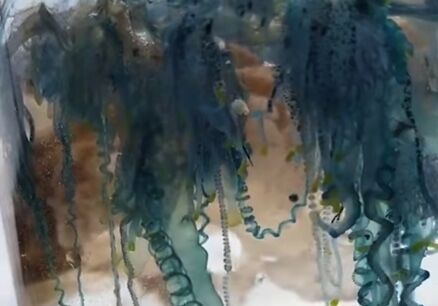Phuket lifeguards warn of poisonous jellyfish on island beaches

Phuket Lifeguard Service has issued an official warning to beachgoers and swimmers about the presence of poisonous jellyfish in the waters surrounding the island. The alert comes after several Portuguese man-o-war jellyfish was found washed up along the west coast beaches in recent days.
A photo of one such jellyfish was posted on the Phuket Lifeguard Service’s official Facebook account, accompanied by a warning and advice on first aid measures for those who might be stung. The post advised those affected to seek help from lifeguards on the beach or visit a medical facility, such as a doctor’s surgery or hospital, reports The Phuket News.
If neither of these options is immediately available, the post urged individuals stung to wash the affected area with seawater and remove any visible tentacles using a hard object, not their fingers or uncovered skin. It also warned against massaging the area or applying any form of medicine, including vinegar, as this could cause the poison to spread more quickly throughout the body. If possible, the sting area should be immersed in hot water for at least 20 minutes before applying a light compress to alleviate pain and swelling. Following this, the individual should proceed to a hospital as quickly as possible.
Portuguese man-o-war jellyfish, officially known as Physalia physalis, are native to the Indian Ocean and commonly appear off the coast of Phuket during monsoon season. Often referred to as “blue bottles,” these creatures are the most venomous jellyfish in the world, and their stings can be potentially fatal. While they do not actively attack, their tendency to float in the water means they frequently come into contact with unsuspecting swimmers. As a result, the Phuket Lifeguard Service has urged everyone to exercise extra caution and vigilance while in the water.
A few months ago, Phuket released a jellyfish warning due to the rising number of stings. Read more HERE.
Latest Thailand News
Follow The Thaiger on Google News:
























